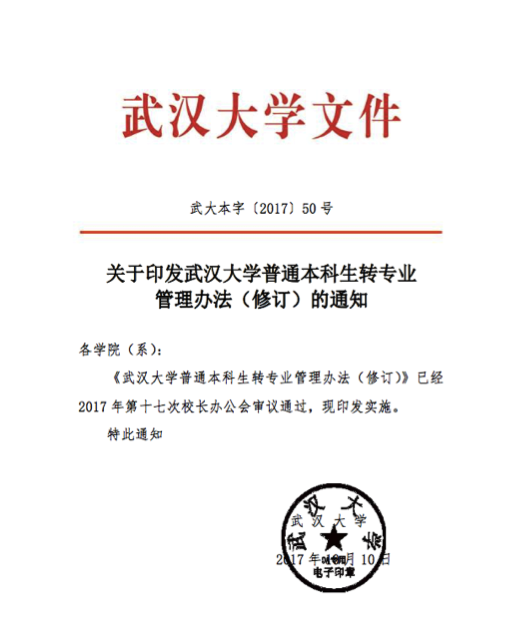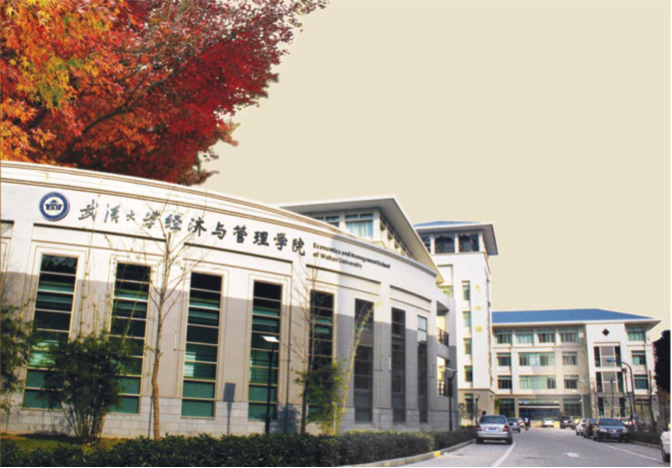Recently, Wuhan University (WHU) released the list of students whose requests to change their majors were granted. Thereupon, March 2018 saw 711 WHU students given the chance to switch to their preferred field, 183 more compared to last year, up 34.66%.
At the beginning of each spring term, a number of freshmen and sophomores will submit applications to change their majors. Thanks to WHU’s increasingly tolerant policy on changing majors, more and more students are now permitted to enter their desired field of learning, making this expanded list of delighted students in March 2018 possible.

Policy on the changing of majors for WHU’s undergraduates (Revised)
According to the announcement posted on the official website of the Undergraduate College of Wuhan University (http://ugs.whu.edu.cn/), WHU is relaxing the restriction on changing majors to fully arouse students’ enthusiasm and initiative to learn. The “Policy on the changing of majors for WHU’s undergraduates (Revised)” published last year, puts it clear that all undergraduates are free to submit their applications for changing majors. Neither the university nor any school (or department) of it shall hinder students from leaving their current major and taking the interview or test to enter their desired school and major. In the meantime, to guarantee the quality of talent cultivation, each school and department is supposed to take in an appropriate number of students after due considerations of their teachers and operating conditions.
The 2018 revised policy on changing majors allows more students to engage in their passionate academic field or career path, further reflecting WHU’s principle of undergraduate cultivation: focus on students’ all-round development, respect students’ interests and strengths, and allow students to tap into their personality and aptitude. 711 students have transferred to a new school or department, an increase of 183 students compared to the year prior. Quite a few of these students are sophomores, to whom the changing of major must have been one of their most courageous decisions.
Gu Bitao, a sophomore switching from the Department of Sociology to the Economics and Management School, said after changing her major, that she finally found a clearer direction to strive for. “The truth is, after studying for one year and a half, I found myself really not that into sociology, and reading classics was so tough for me that I often felt lost.” Apart from gaining a stronger sense of purpose, Gu added, “I’ve also got to know more excellent peers, who all work so hard and always do such a good job, they push me to be better.”

The Economics and Management School of WHU
Another student, Zhang Yiran, is also a sophomore who chose to major in literature after having been in the School of Civil Engineering for three semesters. When asked about his reasons for changing major in the second year at university, Zhang replied, “Because doing what I like is the most important, since I seldom try hard to achieve the things I’m passionate about or live according to my authentic self. So I don’t want to miss my passion again this time.” According to Zhang, WHU’s policy on changing majors in 2018 is more tolerant than last year, which has given him the chance to get closer to literature. However, transferring from engineering to a highly theoretical discipline such as literature is undoubtedly a huge change. Though he ironically called himself “an idealist” and “somewhat naive”, Zhang also expressed that, “We may often hear that literature is useless compared with practical sciences, but it is exactly in this sort of uselessness that literature’s priceless value lies.”
In later stages of the major-changing process, the schools or departments will guide the students permitted to change majors through certain formalities. The university will specifically open the course selection system for them to choose courses tailored to their new majors. The credits that these students received in their previous major will count as credits of elective courses, each school and department is responsible for this course transfer process.
Major-changing means that students will have to complete the normally four-year courses of a new major in a shortened period of time: 3.5 years for freshmen and 2.5 years for sophomores, and some will even face delayed graduation. Gu Bitao, who is under the pressure of completing four-year courses in two and a half years, said students needed to weigh the pain and gains carefully and have a firm belief before deciding to change majors. “There is no easy road, especially for sophomores, so we have to figure out whether it is worth it.”
Though WHU’s major-changing policy is eased and gives students more freedom to develop according to their aptitude, there is still room for improvement. Lu Quanzhu, a current sophomore who transferred from English major to Law School last year, pointed out that the schedule of changing majors at the beginning of the spring term can be moved forward because students should start the courses from their new major as soon as possible. From their experience, students who have changed their majors usually start their studies after the first month of a semester, which makes it harder for them to catch up.
In addition to changing majors, there are other choices for WHU undergraduates as well. They can also choose minoring in another discipline or double majoring through the Cooperation Consortium of Wuhan Universities. What’s more, the university is launching General Education 3.0, in which all students are required to take “An introduction to humanities and social sciences” and “An introduction to natural sciences”. In addition, the university also encourages students to choose courses from other schools (or departments).

General Education in WHU
Wuhan University is deepening its reform of the teaching management system. It now focuses on cultivating all-round talents, commits to creating a favorable environment for students in order to establish a university that satisfies the needs and will of society.
(Photo from the Internet)
(Edited by: Wang Wei, Edmund Wai Man Lai, Liu Jiachen and Liu Xiaoli)